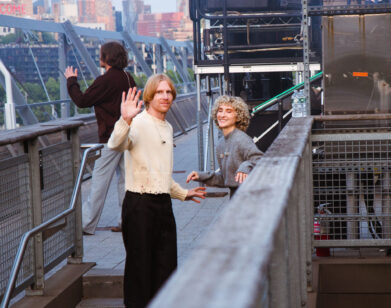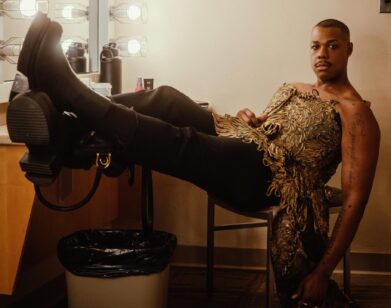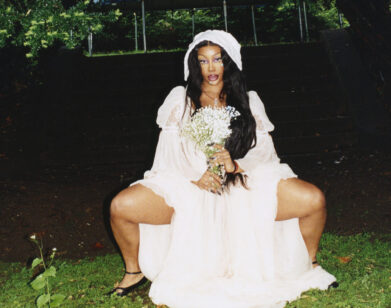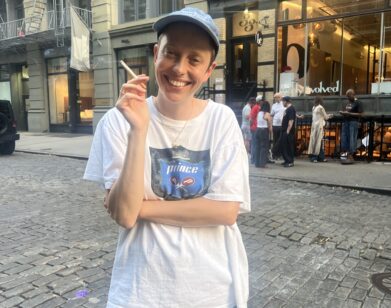Andrew Wilson on Plath Behind the Glass
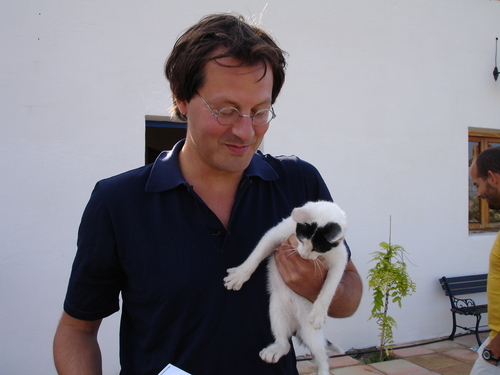
ABOVE: ANDREW WILSON (LEFT) WITH A FRIEND
Fifty years after the death of Sylvia Plath and publication of The Bell Jar, Andrew Wilson’s new biography of Plath, Mad Girl’s Love Song, attempts to salvage Plath from the wreckage and splendor of her public image.
Relying on previously unpublished letters and archives, and interviews with formerly silent friends, lovers, and colleagues Wilson’s narrative of Sylvia Plath the human is just as compelling as the story of Sylvia Plath the icon. Wilson’s meticulously researched account of Plath’s early life takes its name from one of her villanelles, which contains the refrain, “I think I made you up inside my head.” Mad Girl’s Love Song depicts an intellectual and ambitious young woman who fretted, not only about literary immortality and personal identity, but also about the hydrogen bomb, how to help her single mother pay for her college, and whether she would find a date to the Yale prom. It is a heartbreaking reminder of the ordinary reality lurking beneath our fantasy of the writer.
CALLIE BEUSMAN: Plath mythologized herself, was mythologized by her lovers, and continues to be mythologized by casual readers and academics. I’m interested in how much of this is through Plath’s doing and how much happened after she became a literary figure.
ANDREW WILSON: She did constantly mythologize herself, as did many of the people who knew her. I think it’s really fascinating, because she did open herself up—like she says—like an anatomical Venus so her psyche could be exposed for all the “peanut-crunching crowd” to see. That opens up to this tendency, this desire, for us to mythologize her. She obviously saw herself as some kind of Electra figure. She also saw herself as Alice in Wonderland, and, to some extent, as Isabel Archer—so not just mythological characters, but fictional characters as well. But also I think it’s important to remember that, fundamentally, she was a real person living at a real time. The reason that I call my book Mad Girl’s Love Song is really not to call her mad as in the insane sense, but to refer to the fact that she was an angry young woman, and that sense of feminine anger really comes through in her journals and her poetry. I think that many, many women and many people connected with Plath’s poetry and her work to such an extent because they saw her as a person, as a real woman dealing with very real concerns.
BEUSMAN: What would you say were the primary sources of this anger?
WILSON: Growing up as a young woman in the 1940s and ’50s must have been incredibly difficult, and she articulates all those kinds of concerns—the idea that sex was constrained. Many of the people I interviewed told me that all of these young people were basically living in Victorian times. They had these conventions they had to be constricted by, and going on dates was a very ritualistic process. That was one of the things that made her incredibly angry, the sense of hypocrisy that she felt with her male contemporaries, that they could actually express themselves sexually, whereas she couldn’t. I think the other thing that she felt really angry about was the fact that she wasn’t born into a family that was wealthier. Her father died when she was eight, which really constrained the family’s economic circumstances. You get all these entries in her journals where she talks about this desire to have come from a family that was more intellectually based, one that was wealthier. There’s that very poignant quote where she discusses how, when she wanted to bring boys back to her house, she’d have to dim the lights of the sitting room so they wouldn’t be able to see the fading, torn wallpaper on the walls.
We sort of project all of our fantasies onto her. What Ted Hughes said: we use her story as kind of mysterious dream, and it’s almost like a free space for people to air their own dreams and nightmares, to project them onto her like a tabula rasa. And I suppose that’s part of her ongoing appeal.
The sense that you get from her writing is that her great quest was a search for the self, this idea that her identity wasn’t stable. As you say, that’s a very modern sort of concern. I think, in a way, that’s what makes her appeal not just to women, but also to everybody. We’re very privileged, because she wrote all of this down in her journals and her letters and her poetry, and the archives are so enormous—it’s almost that each heartbeat is archived, and that’s very much due to [her mother] Aurelia’s curatorial zest. Thanks to her, I think the Plath archive is one of the biggest archives of a writer in the world. Every single moment is documented in detail, and I suppose that kind of feeds into the sense of her being somehow a fictional character.
BEUSMAN: I’m really interested in how you tracked all your interview subjects down. I especially want to talk about Plath’s boyfriend before Ted Hughes, Richard Sassoon.
WILSON: Richard Sassoon—in Janet Malcolm’s book, The Silent Woman, she describes him as the most elusive and, in many ways, the most beguiling of all Plath’s men. There’s this great quote, she says, “The habit of longing from him has been passed from Plath to the community of her biographers. Not one of them has been able to find him. He’s disappeared without a trace… his entire post-Plath history is unknown.” As soon as I read those words, obviously, I saw that as a real challenge, to try to find him. And I did find him. He proved to be quite a tricky subject, quite understandably so, because I think he’s been probably misrepresented in some Plath biographies in the past, and I don’t think anybody’s actually put in the amount of work necessary to track him down. I found him using very old-fashioned means, like looking through the telephone directory. It didn’t take a great deal of skill. He didn’t really want to give an interview—he made this point very, very clear. But he did, over a period of time, gradually enough… we had an email correspondence that sort of unfolded over the space of a couple of years. He dropped these clues that led me to some of the stories that he’d written, which he told me were very autobiographical. He wouldn’t come out and say, “This is my story,” and tell it in a straightforward interview, but what he did do was give me pointers that lead me to piece me together his story, almost as a jigsaw.
BEUSMAN: Did he tell you how he felt about her marriage or her life after him?
WILSON: No. But he gave me permission to quote his letters, which was great, because it’s this mass of material that hasn’t been published before. There is a letter I quote right at the end of the book, where he writes—it’s a very poignant letter to her—after Sylvia Plath has written to him saying, “Please don’t contact me anymore,” because she’s engaged to Ted Hughes. In this letter, [Sassoon] quotes that Wallace Stevens poem, “The Well Dressed Man With A Beard” and says, “I read somewhere that after the final no comes a yes / And on that yes the future world depends,” which strikes me as very profound. I think that gives insight that he perhaps knew that Ted Hughes was maybe not the right choice for her. That phrase is so full of regret and poignancy, because, of course, Richard Sassoon rejected her when she went to Paris, and I think that, if he hadn’t, she would have probably married Sassoon and would never have married Ted, and, honestly, maybe her whole future would have been different. Who knows? And I end the book on that tantalizing note—these possibilities, these different options, that Plath might have had had Sassoon not rejected her.
Obviously, people have their positions—whether they support Hughes or they support Plath, that’s theoretically based or ideologically based or personally based or whatever. I think it’s interesting how we see Plath and Hughes throughout the decades since Plath has died—in the 1960s and ’70s and ’80s, there was an understandable feminist approach, where people blamed Ted Hughes for Sylvia Plath’s death. There is an argument to be made there. But I think nowadays, hopefully, we’ve branched out from that black and white Plath-Hughes divide. That’s what I tried to do in the book, really.
BEUSMAN: I’d like to talk about the relationship between fiction and reality in Plath’s life.
WILSON: Yeah, it’s almost like a hall of mirrors; you get the real-life incident, which is then represented often in letters and often in more than one letter, sometimes changing it ever so slightly. Then you get the representation of the incident in the journal, then often in a story or a poem. You’ve got all of these reflections and mirroring effects of one incident that becomes even more fictionalized.
Plath used life around her to the fullest possible extent, often not disguising people’s names. I mean, if you look at the first draft of The Bell Jar, which Smith College has, the character of Joan Gelling is called Jane [after her classmate, Jane Anderson]. That led to a huge defamation action in the 1980s, where Jane Anderson sued the Plath estate and the makers of the 1979 film The Bell Jar for libel, and Jane actually won her case. It was settled before it went to jury, and I think she won about $150,000. You look at the drafts of The Bell Jar and you see the process that Plath went through to make reality into fiction, and it’s an incredibly complex process. I think Plath always felt guilty about this, the fact that she could never imagine something that happened that had not happened to her. She had an imagination that was constrained by reality, she couldn’t really write anything outside her own experience. I think Aurelia must have rued the day when she gave her daughter Sylvia a diary as a young teenage girl. When “Sunday at the Mintons” was first published, [Plath] felt terribly guilty because she thought that [her boyfriend] Dick Norton was going to be aware that he’d been used as a model for one of the characters. To some extent, one could interpret the publication of The Bell Jar two weeks before her death, obviously under an assumed name, as one of the contributing factors that led to her suicide.
BEUSMAN: And her use of people goes both ways: she both uses real people in fiction and then, in her life, she would fictionalize real people. There’s that constant need to cast other women as her double or her mirror image.
WILSON: Yes, I think that’s one thing that hasn’t really come out in previous biographies, that she did have this compulsion to very, very quickly find women that she could use as, as she called it, her doubles or her alter egos, and project emotions and fantasies onto them. Often, they never felt this or were even aware of it. I had interviews with many of these women, and lots of them said that they felt this great sense of friendship from her, but also a sense of strangeness as well. They often didn’t really feel some of the emotions and opinions that Plath ascribed to them. They were innocent of the workings of Plath’s mind. And why wouldn’t they be? It’s interesting, that quote that [one of her friends in college] Nancy Hunter said: she and Plath were Siamese twins, joined at the ego. That’s, I think, why many of her female friendships broke down, because she had expectations for them and projections that were completely unachievable.
BEUSMAN: And the same for her boyfriends, for the most part.
WILSON: Yes, exactly. And I think she was aware of that. In one of her journal entries she says, “I want a nonexistent romantic hero.” She projected all these fantasies onto people like [one of her college boyfriends] Gordon Lameyer, Richard Sassoon, and then, finally, Ted Hughes. Who could live up to such an ideal? Obviously, she realized this to a certain extent, calling herself an Electra figure and writing poems like “Electra on Azalea Path,” where she basically linked this desire for romantic projection back to the loss of her father when she was eight. This figure of the ghost of her father haunts most of her work and many aspects of her private life as well.
BEUSMAN: At two points in the book, you refer to the process through which she replaced love with words.
WILSON: Words were her great love affair. Without words, she couldn’t exist. In her poetry, she often dreams of this terrifying time where she won’t be able to compose poetry. A time in which, as she says “cabbages are just cabbages and kings are just kings”—the idea of metaphor would just disappear and she would be back to this normalized state where fiction, creativity, doesn’t exist. I think words were her greatest love. Anything else was second best.
MAD GIRL’S LOVE SONG IS OUT TOMORROW.

